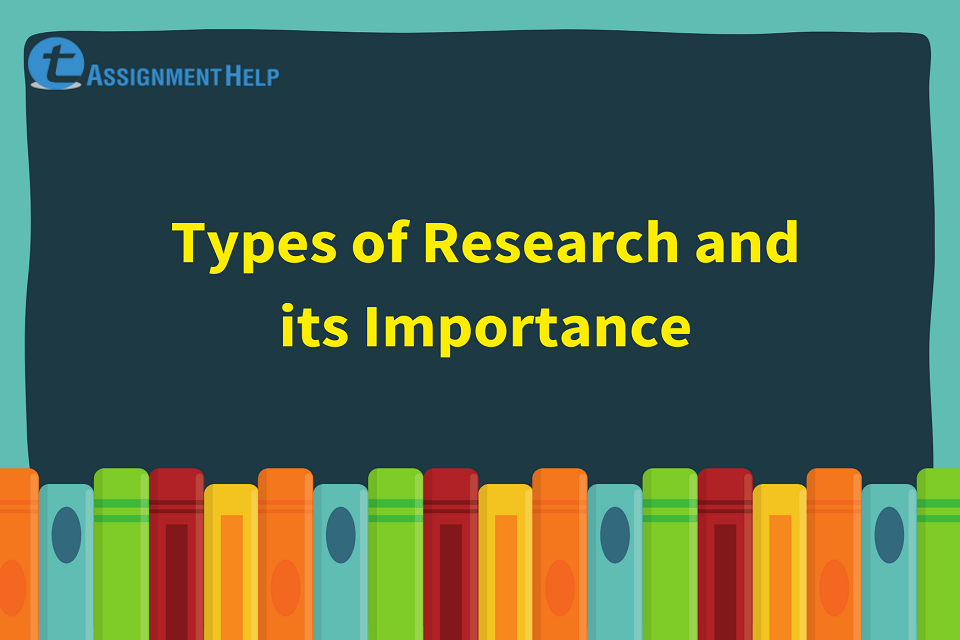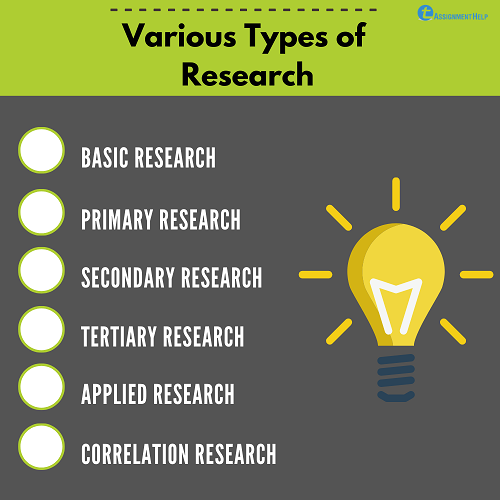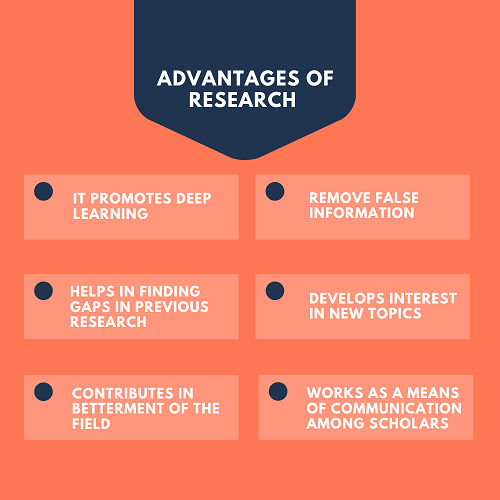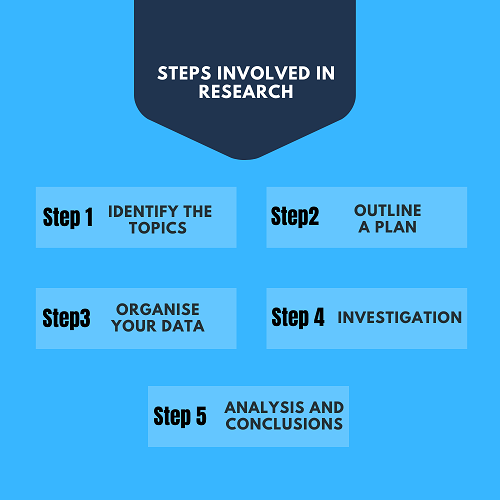Research
Research is the systematic and comprehensive study of a particular subject or problem to gain in-depth knowledge about it. Research is done on various topics all over the world by any individual who wants to expand their knowledge base on something. The research includes simply a google search and compound scientific studies. Any effort to look towards the unknown to find an answer is research. There are various types of research, it can be simple and technical based on its subject.
Subscribe our YouTube channel for more related videos
Importance of Research
Research and development chime in sync with science and technology. Research is kind of an exercise for the mind. It helps to build knowledge and enhances the learning ability of an individual. It keeps people aware of the various recent issues and advancement around the globe. It acts as a medium of communication for scholars, scientist, authors, experts, and students of any discipline. The different types of research techniques build leadership, creativity, analysis, reading, problem solving and cognitive abilities in a person. It is an important tool for the success of any business organisation or industry. Research can help you find opportunities and methods to help you succeed in your life daily.
These days a lot of informal research starts with a google query and the result to most of them take you to a Wikipedia page. It is relatively simple to obtain information from an unknown source, what is difficult is to evaluate its credibility.
Requirement of Research
Research is a skill which is a necessity for students, scholars, academic professionals, scientists and many more. Research is required for experimenting. It is required for students to help them score better grades in their academic courses. It is mandatory for a student to publish their thesis or research paper to complete their graduation from any university almost all over the world. Scientists and scholars are required to publish the finding of their research so that it may be utilised in the future by any individual to further explore the topic. Research is a skill which plays a very crucial role in the development of a person’s individuality.
Types of Research
You take a method to improve your understanding when you want to get the data about a specific subject. There are different types of researches which are utilized in different kinds of study out there but the sort you prefer relies on you.
Classification in terms of the type of data being analysed
Depending on the type of data being analysed, research may be divided into two types. All other types of research can be broadly categorized in these two types. These types are:
- Quantitative Research
- Qualitative Research
Quantitative Research: Quantitative research is an organised way to gather and analyse information to conclude. This technique of research is used to obtain and evaluate information using a mathematical and statistical approach. It utilizes huge amounts of data from different sources to analyse and find discrepancies in them. It sets out the odd on and finds a trend in the data to calculate the conclusion Quantitative refers to quantity or amount. It is a type of research which involves the collection of data and analysing it with the help of statistics, graph and tables. It is mostly conducted in social sciences using numerical data and statistical methods.
The data collected on which the analytical study is performed may be in the form of surveys, polls, questionnaires or results of previous experiments. This data is then used to find a correlation in them or a pattern of behaviour which would spread some light on the subject of the research.
Qualitative Research: Qualitative research is an inquiry related method that enables in-depth knowledge of the problems. This type of research mainly utilised human interactions to get information. It helps in providing insights into a specific issue. It involves the study of behaviours and emotions and other aspects of human psychology which are open to interpretation. It cannot be performed by everyone.
Its data comes from a smaller group of sources as compared to quantitative research methods. It relies on the experience of the researcher and their skill to analyse and interpret the subjects correctly. It is conducted in the form of interviews, case studies, focus groups etc. It is mostly descriptive and non-numeric. It can only be explained with the help of words and figures.
Classification of research based on its purpose:
Depending on what stage the research is being performed, it can be categorized into 3 types:
- Primary Research
- Secondary Research
- Tertiary Research
Primary Research: This is the kind of research which is conducted at the beginning of any operation. It is also known as exploratory research as it is performed to explore the topic of the study. It sets the base for all further calculations and analysis. It does not directly contribute to the conclusions of the research. It is the data collection process. It helps in deciding how elaborate the coming steps of the research are going to be.
Secondary Research: It is performed in the intermediate stages of an experiment or research process. It is also known as Descriptive Research as it helps to describe the problem at hand. It spreads light on the issues faced. Its main purpose is to explain the behaviour of trends in the data collected. It involves calculations and analysis of the data with the help of both quantitative and qualitative methods.
Tertiary Research: It is the final stages of research which is performed to make conclusions of the experiments or study. It can also be termed as Explanatory research as it describes the results or the whole process of the experiment. It builds upon the hypothesis and researches previously present. It is a highly structured approach to study.
Some other miscellaneous forms of research techniques are:
- Basic Research: It is the simplest form of research. Any research which is done with the sole purpose of gaining information and to enhance one’s knowledge is known as Basic research. For example Google search about an indigenous species of animals.
- Problem Solving Research: This type of research is conducted to find the reasons behind an issue or a problem. The sole purpose of this research is to provide the solution of a particular problem. For example: Finding answers to how you can fix a broken motorcycle carburettor.
- Applied Research: This is the type of research which utilises the abilities of an individual to analyse the data to find a solution. Scientists do this kind of research to analyse their finding and make a conclusion from it. These kinds of research help scientists to make major discoveries. It may be done by an individual or a group to solve practical problems in the fields of medical, science, engineering or business.
- Correlational Research: This type of research sets out to find the similarities or differences in two or more sets of data samples or groups without any manipulation. It may or not establish the cause or effects of this data on the said groups.
Advantages of Doing Research:
- Research enables deep learning abilities in an individual
- It eliminates false allegations and theories
- It helps in discovering significant articles related to the research subject.
- Research provides you with the ability to choose sides in an informed way.
- It enables on to discover discrepancies in other authors researches and published works so you can provide an opportunity to correct it.
- It helps in formulating hypothesis and proof to back it up.
- It helps in analysing, interpreting and arranging collection of data.
- It can be applied in the smallest and biggest projects.
- Research acts as a means of communication among scientists and scholars and students alike.
- It allows you to contribute to the betterment of the world.
- Research helps in developing interests in new topics.
- It acts as a medium of learning for individuals all over the world.
- Research helps in finding proof for a presented theory or hypothesis.
Methodology of Research
It is important to follow some pre-defined steps to maximize productivity and minimise any distractions and wastage of time and assets. Let us consider the steps involving a successful research process.
Step 1: Identify the topics:
It is very important to understand the topic of your research and the purpose of your research since it will determine the depth and importance of your research. List all the terms and objectives on which the research is to be done. Organise all of your heading and subheadings so that you can perform your data collections process easily.
Step 2: Outline a plan:
Having a plan will help in performing your research in the most efficient way. It will make sure you utilise your time in the best way possible. Determine the types of research which you have to conduct according to your subject of study. It is very easy to get distracted from the target of your research if your subject of study is particularly vast. Form a planned outline of the process of your research. Prioritise the topics which need your utmost attention and then form a strategy considering the flow of topics.
Step 3: Organise your data:
This is a very simple yet decisive technique. Collect all the data that you find in your research and organise systematically so that it makes it easier to read and analyse it later. Depending on the nature of your experimented data you can either use a notebook or even an excel sheet to organise your data.
Step 4: Investigation:
Now that you have collected and organised your data, it is time to work on this data to find the resolution to your problems. But first, you must make sure that your data is authentic and free of any mistakes. Review the accuracy and legitimacy of your findings so that it doesn’t cause any problems during the analysis.
Step 5: Analysis and Conclusions:
Analyse the data and perform the necessary calculations and interpretations from it. It is very important to correlate your results to the initial motive of your research to make sure you get all the answers you set out to find in the beginning, refer to the list you made if necessary. Review the answers and conclude.
Surely these steps might need some alterations and fine-tuning depending upon the complexity of your particular subject of study, but the basic premises remains the same.
Research is an aspect which plays an important role in any industry or operation. Research has found its application in the working of many organisations. With the fast-paced development of technology, it is necessary for the people of any country to keep up with the new techniques which make research more efficient. Research can be applied in all of the departments in an organisation. It is utilised in sales, HRM, marketing, management, accounts, delivery, managing inventory, and any other field where there is a possibility of improvement with the help of studying data or behaviours to make relevant theories and conclusions. Research should be encouraged in any organisation or operation as it is an integral part of a person’s day to day life.
Students are also encouraged since the very beginning of their learning stages to perform researches on various topics on their own. This helps in the development of their brain and personalities by developing leadership, analytical and complex problem-solving skills. That is one of the important reasons why almost all of the schools and universities in the entire world require presenting research in the form of academic writing like thesis, dissertation or research paper. This research has to be performed by the student alone or in a group to graduate from the respective university. It plays an important part in their final grades as well. Therefore an individual must possess the right researching skills to survive in the fast progressing world of technology.
Hope this article helped you in providing clarity about distinguishing various types of researches and preforming your research more efficiently.







